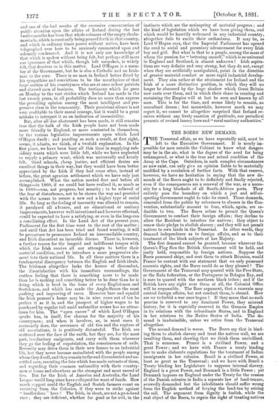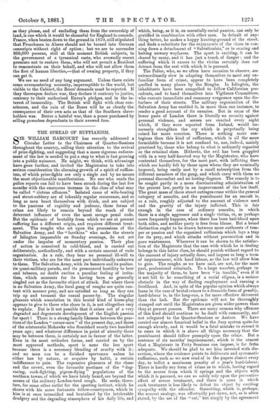THE BOERS' NEW DEMAND.
THE Transvaal affair, as we have repeatedly said, must be left to the Executive Government. It is nearly im- possible for men outside the Cabinet to know what dangers may be in the air, what is the degree of the need for being unhampered, or what is the true and actual condition of the Army at the Cape. Outsiders, in such complex circumstances as now exist, can only give an opinion liable to be materially modified by a revelation of further facts. With that reserve, however, we have no hesitation in saying that the new de- mands of the Boers ought to be definitely and finally rejected, even if the consequences are a renewal of the war, or a neces- sity for a long blockade of all South-African ports. They entirely pass the boundary on which a just and self-re- specting Government ought to take its stand. Those demands, concealed from the public by references to clauses in the Con- vention, substantially amount to four, which, again, are re- ducible to two. The Boers refuse to permit the Queen's Government to conduct their foreign affairs; they decline to allow the Resident to interfere for natives ; they object to renew their pledge to abolish slavery ; and they will not permit natives to own lands in the Transvaal. In other words, they demand independence as to foreign affairs, and as to their treatment of the black subjects of her Majesty.
The first demand cannot be granted, because wherever the Queen's Flag flies the British Government will be held, and justly held, responsible by foreign nations. Suppose the Boers possessed ships, and sent them to attack R6,union, would France be content with our statement that we only possessed suzerain rights, and the Boers could do as they pleased ? The Government of the Transvaal may quarrel with the Free State, or the Zulu federation, or the Portuguese in Delagoa Bay, and is sure to quarrel with the northern black tribes ; and if the British have any right over them at all, the Colonial Office will be responsible. The Boer argument, that a suzerain may control foreign affairs, but not conduct them, is absurd. How are we to forbid a war once begun ? If they mean that no such proviso is reserved to any dominant Power, they misread history, for it is especially reserved to the German Empire in its relations with the subordinate States, and to England in her relations to the Native States of India. The de- mand is inadmissible, unless we retire from the Transvaal altogether.
The second demand is worse. The Boers say that in bind- ing them to abolish slavery and treat the natives well, we are insulting them, and showing that we think them uncivilised. That is nonsense. France is a civilised Power, and a great Power ; and we have with France a treaty binding her to make elaborate regulations for the treatment of Indian immigrants in her colonies. Brazil is a civilised Power, at least as great as the Transvaal ; and we have with Brazil a Treaty binding her Legislature to suppress internal slavery. England is a great Power, and Denmark is a little Power ; yet Denmark imposes on England under the Treaty for the cession of the Danish colonies in India a separate law of land-tenure, avowedly demanded lest the inhabitants should suffer wrong from the English method of levying the land-tax by seizing the soil. The argument from dignity is foolish, while the real object of the Boers, to regain the right of treating natives
as they please, and of excluding them from the ownership of land, is one which it would be shameful for England to concede. France, when beaten down to the ground in 1870, still stipulated that Frenchmen in Alsace should not be turned into German conscripts without right of option ; but we are to surrender 800,000 persons, still at this moment British subjects, to the government of a tyrannical caste, who avowedly resent promises not to enslave them, who will not permit a Resident to remonstrate on their behalf, and who will not allow them the first of human liberties,—that of owning property, if they can get it.
We see no need of any long argument. Unless there exists some overmastering necessity, imperceptible to the world, but visible to the Cabinet, the Boers' demands must be rejected. If they thereupon declare war, they declare it contrary to justice, contrary to their authorised Envoy's pledges, and in the in- terest of immorality. The British will fight with clear con- sciences, and the ruin of the Boers will be as clearly the consequence of their own acts as that of the Southern slave- holders was. Better a hateful war, than a peace purchased by selling powerless dependants to their avowed foes.































 Previous page
Previous page